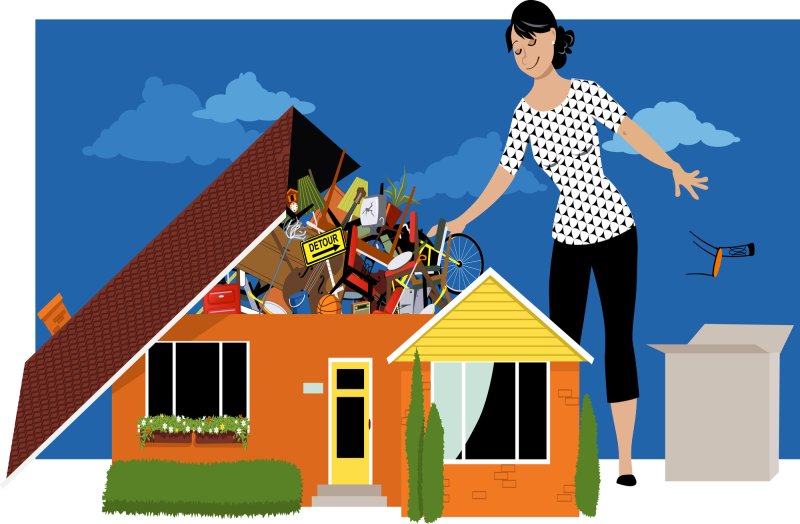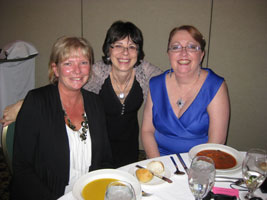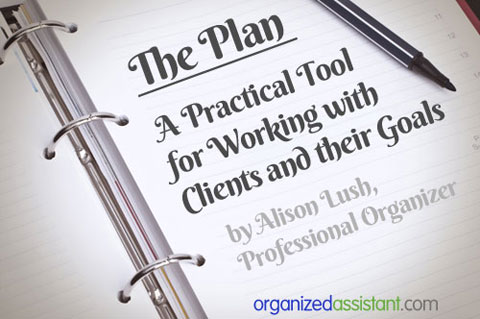Niche opportunity: Chronic disorganization
This page may contain links to Amazon.com or other sites from which I may receive commission on purchases you make after clicking on such links. Read my full Disclosure Policy

Does the phrase “chronic disorganization?” make you think of a challenge or an opportunity?
If you don’t feel qualified to help clients who are chronically disorganized, that’s a challenge you can overcome.
I know ICD Certified Chronic Disorganization Specialist Lucy Kelly through Blogging Organizers and the Productivity & Organizing Blog Carnival, so I was thrilled when she offered to share this valuable information with you!

If you’re not working with chronically disorganized clients yet, you’re missing out. Not enough organizers serve this market, so it’s an ideal niche to grow your organizing practice.
What is chronic disorganization?
The Institute for Challenging Disorganization defines chronic disorganization as clutter that
- persists over a long period of time
- frequently undermines quality of life
- recurs despite repeated self-help attempts
It’s not hoarding behavior
When you first start out as a professional organizer, your ideal client is someone with a checkbook. So you agree to work with someone whose house overwhelms you. We’ve all done this.
You join a Facebook support group for professional organizers. They tell you to use tough love. That doesn’t sit right but neither does what you’re doing.
You start to dread seeing this client’s name on your calendar.
You feel like a failure.
They pass their housing inspection and fire you. You feel awful yet relieved.
It’s not affluent acquisition
Vowing never to be in that situation again, you choose to work with busy, well-off clients. They want you to take their homes from 95 to 99.99 percent organized and they’re willing to pay top dollar.
Tiffany wants you to organize her clothes. She has three full closets, plus another for her shoes. She hasn’t got time to go through anything with you, but she gives you free rein.
Your job is to curate Tiffany’s clothes museum. Many of the tags never come off the clothes. Great paycheck, but is being Tiffany’s personal assistant worth the tedium of doing the same thing over and over again?
It’s definitely not minimalism
So you explore minimalism. That’s fun for a while but then you realize the clutter’s still front and center. This crowd is still thinking about their stuff all day long.
Mandy is thrilled to work with you to pare down her clothes. She says she has 40 pieces of clothing but wants only 30.
A month later, she calls you back to help her cut down to 20.
You start to feel like you’re enabling anorexic behavior. Eventually, you work yourself out of a job when she’s down to three of everything.
Recognizing chronic disorganization
Chronic disorganization can initially seem like hoarding spectrum behavior. But the difference is, clients with chronic disorganization are motivated to call you themselves.
They don’t want to get rid of everything but they’re tired of not being able to find things. There’s no space to do their projects. They want to have people over but they’re embarrassed.
There’s shame and anger and depression, often seasoned with ADHD. They struggle with sentimental attachment to their things. It’s important for them to tell you the stories about their possessions before they can assess what can go.
Books and blog posts inspire them to get organized but cookie cutter solutions don’t work for these clients. They’ll challenge you to be the most creative, supportive, motivating organizer you can be.
Laundry a never-ending disaster? They’ll test out your idea to put up a clothes rod across the length of the laundry room so they can get dressed and undressed in one room. Their friends laugh, but they’ve solved the laundry problem in a unique way they can maintain.
You’ll need patience
You’ll want to be patient, a good listener, and able to keep their end goals in sight for them. They want to tell the stories, and that’s important, but they’re also hiring you to make a change. You’ll hold the space for them to do both.
Many were raised in a hoarding environment so they don’t have that lived experience of growing up with organization. Or they had tidy parents who did everything for them and wouldn’t let them figure it out. Or their ADHD means hands-on learning works best. For the kinetic learner, working side-by-side with you is the best way to develop organizing skills.
You’ll need to be able to work over time. Regular sessions are more effective than a clean sweep, so if you’re used to working marathon hours to get a project done in a weekend, this will be different. You’re not swooping in to get things done for them, you’re transferring skills.
People with chronic disorganization understand the clutter didn’t arrive in a day, and it’s not going to disappear overnight. Progress will be slow but steady. It’s a win for them and a win for you. Time to integrate the learning for your clients, regular, predictable income for you.
How to get clients
- Most organizers don’t enjoy the challenges of working with chronically disorganization. They’ll happily send you these clients.
- Therapists will often refer their clients to you. The therapists will do the therapy stuff, you’ll do the organizing magic.
When you tweak your marketing and website towards the chronically disorganized, you’ll get calls directly from potential clients too. By the time they call you, they’ve tried and failed to solve this problem many times, so they’re ready.
Next steps
- Check out Judith Kolberg’s book, What every professional organizer needs to know about chronic disorganization. You’ll also enjoy ADD friendly ways to organize your life, by Judith Kolberg and clinician Kathleen Nadeau.
- NAPO has some classes but your main source of education is the Institute for Challenging Disorganization. Your annual dues include access to all past teleclasses as well as the new weekly teleclasses. Listen to the free teleclasses available to professional organizers to get a sense of how deep this resource is.
- Check out the ICD directory and see who’s near you. Ask about their experience working with the chronically disorganized population. Or call me at (720) 526-2114 or email me at lucy@joyfulsurroundingsllc.com.
Photo by cupertino / DepositPhotos

Join the Community
Did you find this post helpful?
Sign up to get new posts by email every week!










I have two chronically disorganized client and I agree that regularly visits (I work with one weekly and one monthly) seem to work best. This isn’t a situation to be changed, but a person whose life needs help to stay managed. I find the work rewarding, while I also still enjoy the “Tiffany” clients. I think patience is absolutely CRITICAL, as well as remembering that I’m not trying to make their life look like mine. We might not get the kind of results which I would personally desire, but that is irrelevant. I want these clients to feel empowered, comfortable, and at peace. Thanks for sharing here on Janet’s blog!
I love that you have such a variety of clients – it keeps life interesting, and serves as a reminder that everyone is unique and different people need different types and levels of support.
Yes, it’s all about the client. I’ve found that when the fit between the organizer and the client is right, the work goes to the next level. Finding your niche is all about discovering what’s the best fit for you so you can best serve the clients you have.
This is an AWESOME blog post! You’ve identified so much of what is frustrating about working with people with chronic disorganization issues, with some GREAT real-life examples.
Although I work primarily in office settings, this applies to those folks, too. Putting papers in files (paper or digital) is just like moving stuff into a black hole for these lovely, intelligent, interesting, charming people. It has challenged me both professionally and creatively to come up with solutions for them. And “solutions” is a strong word! It’s more like ongoing, changing, ever-evolving, never-ending strategies. Serious “out-of-the-box” thinking (quite literally…) “Transferring skills” isn’t really something that happens here. Let’s be real – CD, ADHD, Executive Function disorder – those things never just go away. They can be managed and strategized, but they never really disappear, and neither do the organizing issues that go with them.
In my experience, I can institute systems that will work UP TO A POINT and to a certain point in time, but will never, ever be the end game for them. Things will get “better” (but again, only up to a certain point and for a limited period of time), and only if the client is REALLY ready to institute difficult, habit-changing skills. Frankly, those clients are few and far between in the CD world, and even those folks deal with a life-long struggle. These folks need *ongoing* support.
From some of the responses I’ve read on NAPO POINT, there are some of our long-time, quite respected PO’s who don’t think this qualifies as “organizing work.” Quite clearly in the description of the work that qualifies one to become a CPO® is the “transferring skills” part, and one of my biggest beefs with that aspect of the NAPO credo. And they are probably right – sometimes this work devolves into “personal assistant” territory. But if the PO is ok with that, enjoys it, and it benefits our client, why can’t we expand and evolve our definition into a more realistic realization of what “transferring skills” really means?
Thanks, Lucy and Janet, for sharing such significant stuff!
Thanks so much for sharing your perspective! You’ve put your own twist on Lucy’s sentence “They’ll challenge you to be the most creative, supportive, motivating organizer you can be.” I think it’s important for anyone to know what they’re getting into – and receive the proper training – before diving into a CD situation.
Fascinating, Lisa, thank you for reading and commenting! How interesting how different people define personal assistant work within the organizing context. IMO, the CD client is a chance to effect some meaningful change and transfer of skills. And the typical “NAPO” client is the one who gets the personal assistant to tweak systems and accommodate continued overbuying. Different strokes for different folks! FYI, I’m no longer a NAPO member, so I haven’t seen any POINT discussions over there.
I don’t tune into the discussions on NAPO Point very often. I can only tell you that as a CPO-CD and an ICD Master Trainer, I believe the ICD education is paramount to none. Organizers who are interested in working with people challenged by chronic disorganization and/or hoarding like behaviors will find classes to educate them about this population on the ICD website. You are correct, Lucy, those who have struggled all their lives to get organized want to work with someone who hears them and will work side-by-side with them to create a system tweaked to their learning style. This requires time and patience and excellent active listening skills.
Exactly, Diane. Time, patience and excellent listening skills are key to working with the chronically disorganized client. Many have been burned by working with inexperienced organizers who don’t understand what’s involved in this work. I’m grateful every day for the ICD!
I’d like to clarify something in my previous comment. I agree totally with what Lucy and Diane have said about CD clients (and about the excellent training ICD offers!) My point is that working with CD clients successfully requires not just ongoing support (usually), but flexibility on the part of the PO, and most importantly, an intense commitment and desire for change on the part of the client. In my experience, my work with my CD clients can only go so far without that, and that transferring skills is not always the ultimate solution, or even realistic. My point with regard to NAPO and their requirement that organizing only happens when there is a “transfer of skills” is that perhaps we need to open up our minds to that reality – that the definition of what a PO does as opposed to what a personal assistant may do may overlap with CD clients, and to acknowledge that this is a very real, very important part of the work that many of us do.
Thank you for clarifying, Lisa. I was a member of NAPO for over five years, and agree there are things that would benefit from change over there. You’re right, “transfer of skills” is a super vague statement, which is open to subjective interpretation in my opinion.
And I still maintain that there is a lack of skill transfer with many clients who are definitely not chronically disorganized. I don’t understand how any skills are imparted when the client isn’t present for the work 🙂
“I don’t understand how any skills are imparted when the client isn’t present for the work.” And THIS is why I don’t ever do anything when a client is not present. I consider my work (whether with situationally- or chronically- disorganized clients) to be about improving their lives by training them in skills (even if they’ll never perform the skills themselves) and concepts so they can understand the underlying reason behind what’s going on. I believe understanding “the why behind the what” is a cognitive skill, in the same way that a 10th-grader knowing how to put together an essay is as important as knowing the book about which the essay gets written.
We all have different reasons for why we do what we do, but FOR ME, if the client isn’t in the room, then I’m not acting as a professional organizer. My belief is that tidying and housekeeping is about the stuff, but professional organizing is about the person who owns the stuff (whether the stuff is tangible, temporal, or cognitive); my own practice of professional organizing is therapeutic, even if it’s not medically therapeutic (because I’m not a mental health professional). I tell clients that they’re paying for my insight and expertise; my hands are a value-added bonus. So, if they aren’t in the room where it happens, there’s no chance of lasting success. YMMV!
“I tell clients that they’re paying for my insight and expertise; my hands are a value-added bonus.” Exactly! This is why we can continue to organize when we no longer have fresh knees or super strong backs.
I often suggest to prospective clients that they can save a lot of money by not hiring me if they just want someone to move boxes for them, but if they want more than that, my fees will save them countless time and money over the long haul.
As you say, true organizing is therapeutic, not therapy.
I work with a chronically disorganized client usually once a week for 2 hours. While there has been some transfer of skills he sees me mainly as someone who will help him, without judgement, stay on top of his papers. He claims his desk is one big in-box and without help he would be correct. I enjoy my time working with him. We have worked together for years and our working relationship is comfortable. I actually think he is in Judith’s book.
Jonda, I love this. You have and are helping him, and in addition to the organizing work, have successfully transferred the skill of being able to ask someone for help and trust that person. Way to go! How cool that your client is in Judith’s book!
What a rich discussion! I’ve been working with CD clients for almost 30 years. And so much of what you described, Lucy, I agree with- the creativity, patience, and support needed are different with CD clients. Those are what I love so much. However, I don’t think it’s a matter of pitting organizers or clients against one another. One type is good or bad. The key is with understanding your ideal client and how to serve them best. If you love organizing for clients that are time-poor or not available to participate in the organizing process, great to know! If you love working side-by-side with clients that have struggled with getting organized for their entire lives, wonderful to know! It doesn’t have to be an all-or-nothing scenario. You can have a variety of clients and serve their varying needs. One isn’t better or more worthy than the next.
As far as transference of skills for CD clients goes, even if with ongoing support, skills are still being transferred. But generally, long-term ongoing help is needed for the skills to be reinforced. I agree that NAPO could open its options for certification. But that is up to them. One of the best educational opportunities offered is through ICD. It’s in-depth, personalized, and helpful for all clients. ICD’s education is essential for anyone working with the chronically disorganized population. I’ve invested heavily in ICD’s education and training and it has been worth every dollar and hour.
Thank you for your thoughtful comment, Linda. I appreciate your experience and all that you bring to the organizing field. I don’t intend for anyone to think one type of organizing is better than the other, rather to point the way to successfully working with the chronically disorganized client for organizers who have been put off by earlier, untrained experiences.
When you say, “If you love organizing for clients that are time-poor or not available to participate in the organizing process, great to know!”, to my mind, that’s the opposite of transferring skills. In that case, the non-CD client is not a good candidate for NAPO’s certification rules. As you point out, ICD has a wonderful certification program too.
And of course, a variety of clients is wonderful. My hope here was to encourage those who have avoided working with the chronically disorganized to take another look and realize there is wonderful training out there to help you expand the variety of your client base.
Wow – lots of great conversation happening here! Lucy, thank you for writing this article and for being so engaged in the discussion.
Janet, thank you for hosting this dinner party! Great company, great conversation 🙂
This is an interesting and expansive approach to the practice of professional organizing with chronically disorganized clients, and I’m so glad you wrote this for Janet’s blog, Lucy.
I’m less of a residential organizer than most of the group; I DO work with residential clients, but am more involved with the decluttering aspect as a platform for achieving more productivity. Of straight residential work, probably 70% of it is with situationally disorganized clients. When I work with CD clients, it’s with the understanding that they will be working — hard — to learn and change their *behaviors*. We are clear that I’m not a mental health professional, but I do teach them skills to coach themselves on decision-making and critical thinking. I love, love, love that you focused on the importance of self-education through ICD and reading those excellent resources!
As you noted, Lucy, this isn’t a hoarding disorder, but it still requires deep understanding of psychological and neurological components (ADHD, executive function disorders); it’s not conspicuous consumption, but late-stage capitalism, fast-fashion, and the abundance of stuff to buy and acquire sure doesn’t help! And while it’s not minimalism, we have to counteract the minimalist and picture-perfect magazine and social media examples that cow our clients into feeling bad about what they haven’t been able to do on their own. (That’s why I tell my clients that if they work with me, I’ll always focus on function over aesthetics.)
This is an insightful look at the path many organizers take and the things to consider about working with chronically organized client base. After twenty years in the field of organizing, I’ve learned to discern who I can and can’t help based on what they’re willing to learn and do, and how well they are able to commit to the process. Just as no client is like any other, no organizer’s practice is like any other, and I appreciate you spelling out the key concepts!
Thank you, Julie, you’re so right, taking only clients we can help is the key to a successful organizing practice and experience for your clients.
Committing to the process is key, and there are plenty of chronically disorganized clients who can and will commit, once they’ve finished breathing huge sighs of relief that they’re not being judged or written off and that organizing is in fact possible for them.
Being open to working with the motivated but chronically disorganized client is a great way to expand your client base and help people who have almost given up on being able to get organized. As you say, they may not get the picture-perfect images they see on social media and the media, but since those are moments in time, not real life, no one does! Unless they hire someone to plump the cushions, pick up the dry-cleaning and put everything away for them…
Hi Lucy – I no longer do hands-on organizing but when I did, not many of my clients were chronically disorganized. It was interesting to read the journey an organizer can take as they work with different clients — and as they figure out which clients they can best serve.
I have been intrigued for some time about pursuing this line of work. I took all of the baseline classes through NAPM over a year ago to get started so that I could take the extra training at ICD but have let the membership lapse. I really would like to start this effort again but was curious if one must be a NAPM member to pursue ICD. I am specifically only interested in helping clients who have particular challenges but just feel stuck trying to pursue this.
NAPO and ICD are two separate businesses, so there’s no need to belong to one if you feel more drawn to the other.
Best wishes in finding where you feel most at home!
Lucy